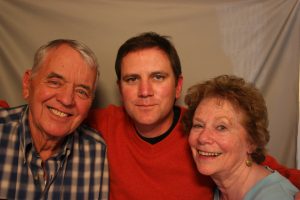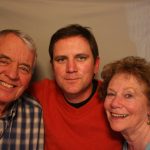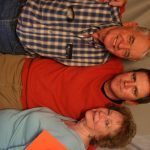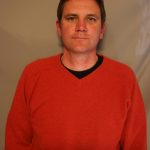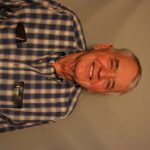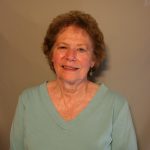LeLand Holstine, Leah Holstine, and Eric Holstine
Description
LeLand and Leah Holstine talk with their son Eric about meeting, their respective careers, raising Eric and about Eric’s children Topher and Anna.Subject Log / Time Code
Participants
- LeLand Holstine
- Leah Holstine
- Eric Holstine
Venue / Recording Kit
Tier
Keywords
- Agriculture
- Butte, MT
- Canada
- Childhood Games
- Conrad, MT
- conservation movements
- conservation programs
- Dairy
- DeMoley
- Eagle, ID
- Family Traditions
- Farming
- Fort Benton, MT
- Future Farmers of America
- Gas prices
- gas shortage
- German immigrants
- government work
- high school sports teams
- memories of growing up
- merchandising degree
- Rexburg, ID
- Soyl Conservation Service
- Spouse
- substitute teaching
- sugar beet farm
- sugar beets
Subjects
Transcript
StoryCorps uses Google Cloud Speech-to-Text and Natural Language API to provide machine-generated transcripts. Transcripts have not been checked for accuracy and may contain errors. Learn more about our FAQs through our Help Center or do not hesitate to get in touch with us if you have any questions.
00:04 Eric Holstein age 41 May 25th 2008 in Boise, Idaho with my mother and my father
00:16 I'm Leland Holstein folks call me Lee.
00:21 I'm 77 years old.
00:25 It's May 25th 2008. Where in Boise Idaho, I'm here with my wife Leah and my son Eric.
00:36 Emily Holstein and my age is 72 today is the May 25th 2008 and we are in Boise, Idaho, and I'm sitting here with my husband Lee and my son Eric.
00:53 Okay.
00:56 Starting with you mom. Could you just tell me a little bit? I know that you've articulated that you sort of regretted not having some of the stories from Grandma and could you start to sort of with maybe a couple of those stories that you do? Remember that? You're just sorta glad you know.
01:18 About my grandmother about my mom. Oh, maybe a better mom or dad or just disassembling things that that you don't want lost and now that we're able to sort of those down as far as maybe the homestead or do you know some of those things and try to forget there's a microphone in front of you.
01:38 Mom grew up.
01:44 In Grass range Montana and her parents separated my grandparents separated when she was in high school. She went with her dad to live in Seattle and then came back and lived with her sister in Brady Montana. And that's where she meant my dad. He gave his dad his family farm there and and they got married in.
02:12 19
02:15 Homeboy
02:17 I can't take now.
02:19 That's okay. I can't remember anyway, some of the things that I wish you talked about when they lived in Grass range from my grandfather took care of a lot of horses. He was from Ireland and I always think of maybe he had that background of horses and helping them and he took a lot of sick horses in and work with them and she talked about one time going out to get her horse and she happened to flash her.
02:53 Her gloves and that was evidently a signal for one horse and he just came tearing at her and scared her to death. But but she enjoyed riding horses her parents separated before it. Where did she live that they lived before went when they were separated and grass range dress rings and then it must mean kind of strange for that time. For a couple to split up, It really was and mom was very rested about she didn't want to talk about it. I think it had a big effect on her and and at that time course, it was very different and not many people did that and so she she didn't even want to think about it. I don't think what you did to any idea why they split up he was Irish Catholic and she was Norwegian Lutheran and
03:51 She always was really mad at her father because he was very dominating She always told the story about when women got the right to vote. My grandmother was in the house getting ready to go to town to vote and my grandfather just took off and left her and so she didn't get to vote and I think he was
04:13 Hey Ya.
04:15 Very dominating type man.
04:18 Okay, Dad. Is there any stories about your parents that you would want recorded and remembered for my both my parents were born in.
04:31 They're Germans and they were born in Russia in.
04:37 Villages on the Volga River
04:40 My mother and her parents came to the United States. I can't remember it was around 1914 or 15 move to Kansas ended up settling in Rexburg, Idaho.
04:57 My dad came he was came over on a visitor's visa to Canada.
05:04 And it was a visitor's visa and he
05:10 Violated that and ended up crossing the line from Medicine Hat Canada ended up in Rexburg and married my mother and
05:23 There were
05:24 Most German immigrants and even though one was illegal. The other was legal at a guess. It made my dad legal then and it breaks for you. They ended up having five.
05:37 They were farming and having five children and I will say youngest of the five.
05:43 In 1939 the Utah, Idaho Sugar Company had a farm in Conrad Montana that needed a farmer and they moved the family the equipment the horses and Buggies everything by railroad to Conrad Montana and we settled on a farm there and raise sugar beets in.
06:08 And night the rest of us.
06:13 It was those days it was a family farm and even as a young age of myself, you would be out there finding beats and hoeing weeds out of the beats and when they talk beats, I was the youngest I got to drive the The Rake over the beach with a horse to founder.
06:34 The dirt off of them
06:39 That's about all I remember the parents. I could go on and on with that from there.
06:45 I went to school grew up with you were born in Rexburg born in Rexburg. How old were you when you went to Conrad? I was 9 years old. Do you remember the trip? Yes distinctly. How did you why did you get to travel by rail with the we travel by car? But the thing that I can remember specifically and I'll never forget this we spent the night in Butte.
07:17 On our way from Rexburg to Conrad and we stayed in a hotel and I can remember.
07:24 Although it was Winter. I had to sleep on the floor because I was the youngest and it was extremely hot and that's all I remember the trip, but I do remember when it landed in Great Falls and my brother is it wise family lived in Great Falls? So we spent some time there until we got settled in Conrad Montana on the Beet Farm.
07:53 It was her house there for you guys to move into was there a house there for you guys tomorrow there was a house there the house so the side of the farm and everything is now the Conrad Airport.
08:05 And yeah, we moved in my mind and my brother Henry's bedroom was in the Attic. There was a 3/4 door on the outside and enter and to leave the our bedroom. We had to climb a ladder.
08:21 And I thought nothing of it when it got cold. We had a bitching feather take that Mom covered this up with him. We were just happy as a lark.
08:31 The so kind of cover said that the background in the family and stuff as far as your growing up and until you're settled in and you know Junior High sort of it.
08:49 Time when you start to really remember things and you're going through puberty and all that Mom, could you start and just maybe tell a story you remember or did you know something from Junior? I didn't
09:05 Thing that stands out to me as my teacher was the judge's wife.
09:12 And she
09:16 Had a very Stern way about her. In fact, she used to also take care of the library for them both of junior high and high school very small school, and she called me over one time when I walked across the floor in the library and she told me that I walked too loud. I had to be quieter in the library.
09:37 But we will see was a fun time. We had to spend a lot of time in with a high school in that area.
09:47 We could go to the Garden in the library, which was the high school library and then 7th and 8th was kind of in and just one separate room is all it was and
09:58 And from there. High school did you participate in sports or did you eat anything sent out in high school sophomore and Junior we had basketball, but at that time you could only play half-court. So you played on your side and then you passed it over to the other half when you went over to the other team and Kendra strange game at that time, but you weren't allowed to do a lot of things kind of things is up women's basketball boys play full-court. Oh, yeah. I'm sure some of the rules have changed but just like they do now but
10:41 But we were supposed to be the weaker sex, I guess and so we had to play half-court.
10:48 Dad anything about Junior High and and could you kind of just go through Junior High and high school as far as well? What stands out? I'm just saying that I remember junior high and I always bring this up at our class reunions. The principal of the school was mr. Ed her back and he flunked me on the 8th grade and there was about three or four of us said that flunked and we used to get each other. I didn't really funk. I stayed in the 8th grade just so I could be with you if you know we could each other back and forth.
11:23 What does that was the best thing that ever happened to me? And the reason I flunked is my dad had severe arthritis. And at that time we had moved from the meat farm to the dairy and they just pulled me out of school. I think for about six weeks to help milk the cows and and do the chores and one day I missed her at her back and in another teacher came to the door and ask my dad when I was going to go back to to school and he says he'll. His hands like that. He says as soon as I can milk cows. Well, anyway, I think that's a major reason a funk. But when on the high school and
12:03 I was a
12:05 Play basketball football baseball and dancing while I mean.
12:12 Is dancing ball a sport? Well, it used to be but I was pretty good at it.
12:20 I was a varsity from sophomore through senior year on on all of those nose football basketball and baseball.
12:29 And it's kind of interesting at that time.
12:32 Tennis, we had a tennis court, but it just wasn't a sport in high school and it was real rare to see girls doing anything from the sport. They could be cheerleaders, but they couldn't play basketball and there was no track meets for him as I recall, but that's through high school and I ended up graduating and end After High School you went on to and you attended College in Colorado, correct? Yeah. I went to Colorado women's college and Denver. Did you start directly after high school or college?
13:17 And it was very good for me because I came from a very small town and it was a very small college and I don't think I would have lasted in some of the larger colleges. So it was a good thing for me in 2 years and you are what did you what was your two year degree in?
13:36 I think it was merchandising or something like that. It wasn't it wasn't a big deal. I guess I got that time. I wanted to go into a dress design in that kind of thing that never happened and dead after high school. But but did you well after high school I worked does a carpenter helper.
14:04 Work when summer on the
14:07 Big farmer that had a farm I ran the night shift summer following and then
14:16 The Korean war broke out and I enlisted in the Navy in October of
14:22 Have a bath.
14:24 1950 I guess it was and spent four years in the Navy and
14:31 Got out of the the
14:34 The Navy and I had the GI bill which allowed me and without the GI bill. I never would have been able to afford to go to college, but I went to college and majored in agriculture education. I had a science minor and graduated in.
14:54 58 in
14:58 Then I went to work for the
15:02 USDA Soil Conservation service, didn't you teach school for a year?
15:08 Did I went did you did you teach school did FFA Future Farmers of America? I was I was in FFA when I was in high school, but the only teaching I did my student teaching.
15:23 And then I had the job. I moved to Fort Benton with a soil conservation service. Could you just tell us quickly not quickly, but could you just tell us how you bet? Yes, and I'm going to take the lien on that.
15:42 We meant in about 1948 or 49 at the demolay, sweetheart ball.
15:50 And
15:52 She was there with her brother.
15:55 And it was like the formal dances we exchanged dances with couples and and that's where we met.
16:04 The first time and the second time we met.
16:09 Was
16:11 In the VFW Hall in Fort in the Conrad Montana and I walked in there and I looked over to the right and they got to explain that VFW in Conrad. Montana is kind of the Gathering Place. It's it's more than just a bar. It's a Gathering Place for for everybody in town that wants to get together. Anyway, I walked it looked over to the right in the booth in their set Leia and two of her friends and and my heart just thumped. I knew that I was had to have her in that I asked to take her home that night and believe it or not. She accepted.
16:52 That's how we met Mom. Did you have another story from a small town? Did you know her brothers is more? Yes. I know her brother Cal very well. We were in demolay together and played Sports against each other right now. And what's Dema? Pardon? What's the male kind of the there's a masonic lodge and the young men's organization that
17:34 Is sponsored by the Masonic lodge and its counterpart for for women is is Rainbow girls.
17:45 And that's from there. They go into Eastern Star like if if you so desire is strictly voluntary.
17:56 So so you guys met and then we're married.
18:01 And how long did you date before you got married? Mom in good answer this one?
18:09 I didn't think I was a probably about nine months nine or 10 months before you get married.
18:16 Let me let me live right on that a little bit after I saw her in the VFW that night and took her home as I recalled. I went back to to Bozeman to college and I was sitting there in a fraternity house. Wondering why didn't I get her address or phone number? So as I recall, I called her mother and got her her address and wrote her a letter and I think
18:47 I came home Christmas and
18:51 And we went back to college the two of us didn't win that time. She had to go back and keep an eye on me.
19:02 Oh, yeah.
19:05 Finish the you're the next summer. We we got married and then
19:12 Went back my senior year in till I graduated from college. You went back to Bozeman. I ran I think to 2/4 can you get schools for education in 9 months never would allow me to do that. But anyway, so and after you got married in your first job was with us the soil conservation service in Fort Benton and you moved to Fort Benton.
19:58 And I've heard a lot of stories about the house and some of that and how did you get settled into 4 pin? And how did you like when you first arrive to do did you buy the house right away or know when we we first arrived there we rented a house.
20:15 Are you ready for an apartment years? I was transferred to Hardin, Montana.
20:23 And we were there two years. I swear Chris was born.
20:26 And then we moved back to Fort Benton. I got a promotion and we were there when Dana was born and lo and behold we were there when Eric
20:43 Her third child was born.
20:45 And from there
20:47 Reserve 5 years and in
20:51 We moved to Havre Montana and until you've done two quarters at Bozeman dad graduated you got married and you were interested in education din-din, but you didn't teach in Forbidden. Did you know I didn't finish I didn't finish until we got up to have her and after all of you were.
21:13 I'd had her all the children. We were going to have and I went back to school and when we moved up there and have her and went to finished at Northern at that time. It was Northern Montana. If so, did you teach at all it ever and now I just my student teaching. In fact, I finished my student teaching.
21:34 And came back home to him because everything was being packed. We were leaving then and I had left this is how cold it was. I had left a mop and some liquid soap and I was going to scrub the floor clean the floors. We went out the door and got home and the truck is broke down.
21:57 The one that was hauling our stuff so somewhere still in the house. Some of the things are still in the house somewhere out sitting on the snow and somewhere in the truck and I just took the mop and everything and took it over to my neighbors and we left.
22:13 So where it was cold they was very cold. And this was 1972 in Idaho as well. Yeah, we drove in here on ice from all the way from from Havre. It was ice all the way and I drove the car and he drove the listen to pick up. What was that? Who's the man that I am and didn't we live in a hotel for a while here about ten days. I think it was we were at 10.
22:54 Mad at the hotel was it during holidays just before cuz we left about the 10th of December. I think and came in we moved into the house on the 19th to the 19th. I think in which hotel is it?
23:10 It's the Riverside.
23:20 So and then you got a job. Yes. I did your first professional job BS. And how did you get that? I did a lot of teaching and ended up had a neighbor who taught out an eagle. And so I did a lot of it there and got to know them real well there and and so that's where I was hired at Eagle Eye.
23:49 Started then the next fall together 20 years and you came to Idaho. You took a different position or well it was a it was a promotion. I was still a District conservation conservationist, but it was a promotion because of the urban area in.
24:13 A lot more complex district and have her have her was strictly agriculture. But here there was quite an urban sprawl developing and so that it ended up being a promotion then that's the reason we moved and as far as the kids go Chris was in junior high.
24:33 Thought he was in 7th grade. How did the move go for him? It was really hard for him to begin with. In fact, I remember coming home and he was sitting at the kitchen table crying and he said put me back in sixth grade because he was the teacher one of the teachers took him by the collar and take him down to the office and said I don't want him which didn't give him a very good feeling but I wasn't too long and he rejected and made some very good friends. In fact friends if he's had all these years and Dana will hold her. She she will send the fifth grade.
25:12 And she didn't have that hard time. It was really pretty easy for her a small, you know a small classroom and and she met some good friends and me. How old was I when you were five and you have any in in kindergarten when we left there and I just kept you out and put you back in kindergarten in the next year cuz I thought you needed another year and I don't know if that was a good idea or not cuz it took you awhile to adjust to that. So to adjust to what I think you felt that I thought you were dumb or something. I don't know because you were really bothered you until you were in the fifth grade and then while you work
25:59 Helping one of the teachers one of the PE teachers with a basketball I think was the girls basketball or something. Mrs. Horton and she wanted to pick up her son while on your way home to take you home and you found out that she held her son out to and you came bouncing in the door telling me all about it and was like, wow, it's okay to be held back and now they called grayshirting. So so the end so as far as you taught through eagle and then you move to Linder Craig, why did you do that?
26:41 A friend of mine was moving too and it was a brand new school and it was closed Eagle was about a five six mile drive and which isn't far and it wasn't bad. But but this one was just about a mile from home and we decided we both of us know this fellow teacher and I decided that we would like to be close to home and that's why we moved the special project. Could you just explain what that was about as far as it was within and so are your careers for working for the federal government and state government? Okay the in about I think this is about 70.
27:26 5 or 7690 to 500 which was directed EPA to address nonpoint source pollution and pollution in general section 208 of that.
27:42 Said that agriculture will prepare a plan to address nonpoint source pollution. Well APA tended to ignore that and the national resource defense Council EPA to court and they said you will.
28:00 Implement section 208 okay, my state conservationist. He sign a sign me to the Idaho Soil Conservation Commission to coordinator the preparation the writing of that the of the of the agriculture water quality program for the state of Idaho and working with them with that all of the state agencies. I can remember we had a a policy advisory committee that was was composed of
28:33 He said he councilman a county commissioner and all through the the the ranks of each state agency in Federal agency was involved in that and I can remember they met once a month and if you've ever been grilled on the hot seat this agricultural this advisory committee put me on the hot seat every every month at our meeting and it's kind of interesting. I I I I coordinated the writing of that because I had the input of of many many many sources and I can remember one of the controversies of one of those state agencies. I won't mention the name, but they could not understand how
29:23 So conservation districts and Farmers would do anything voluntarily to stop pollution and they could not could not understand why we didn't build a regulatory program into this this water quality playing well as it turned out the through the policy advisory committee one of the biggest critics. I won't name his name when I came to accepting the pan the plan he was the one that was the most vocal of the group always putting me on a spot he moved.
29:57 And recommended that the plan be accepted and it passed unanimously and that made me very happy. And from there on it went into implementation or is a cost-share program have funded by the state that went with it. Then it says it was controlled by their local Soil Conservation districts were in Corona. It was grass roots and
30:22 B&B hold it everybody Farmers did to implement these best management practices. They didn't like to see their their firm washed down to the river any more than anybody else and that's kind of day.
30:38 Cut at the end of that, you know.
30:43 It is we enter gas gas prices and some of that I was talking to Todd a friend of mine and about how I seen you guys go see that in the 70s and then purchasing and you know it. Econo box Subaru. They've got good my lights and stuff like that. What what what would you say? Is there a similarity between then and what we're going through now or do or do you think what we're going through now is worse than having lived through that and then started on the edge of where we're at right now dad needs. Well, as I remember in the seventies, it wasn't a the cost in the seventies. It was a shortage.
31:29 And I can remember I never let their vehicles get below half full when it was half full. I went and filled it up because there was a shortage of gasoline and I don't remember the prices of being exorbitant. Do you know Mom to wait? What do you think do at that time? And I I think because it was shortage fight. You just had more of a fear and I don't I don't feel the fear now. I just it's more anger.
32:04 I see now it is you look at Topher and Anna and and you guys get to spend a day a week with him. What's it like Mom when you go first, what's it like if you could just wanted to briefly describe each one of them and sort of any observation to half of those we have about 7 minutes. So delightful I ate just so enjoyable to have him Topher is very outgoing and and very boisterous and he's always been all boy and challenges.
32:41 Not so much Authority but challenges himself physically sometimes to the point of scaring grandma.
32:51 And then just delighting and thinking that he has scared me. He's very precocious. I just I just
33:03 Oh, I know. I don't know I just did is he's just so enjoyable and comes up with with using all sorts of words and and looking at me with
33:15 A twinkle in his eye. He's a Big T's always has been from the time. He could even try to t-shirt even had any inkling of what it was and it was quieter and it took her a longer time to verbalize and come out of herself, but I she has done that so well in and she is not going to be forgotten you're not going to to leave her out in any shape or form now. Any observations of leftover Nana, well on the record, I guess what I enjoy I never had grandparents all the time. I was growing up so far as having near me in the what I remember is how much did Topher is like his father.
34:01 So that kind of brings back memories of his father, but they're just a delight to be around into him for a day a week and
34:13 We're just thrilled. That's them this always something new with both of them each time. They come there.
34:20 Super
34:23 Anything else you guys want to add her?
34:26 Sesimbra probably not going to make NPR National radio. Just nobody crying but I just have one short thing just to say and that's about this program that your dad coordinated and everything. We went to a picnic here just about a month ago and it was the 60th anniversary of the Ada soil conservation and the state conservation is with beer and he told Dad that they still use that program and still refer to it and he said for it to be 30 years old and still do that. It's very extraordinary. So I thought there was a big feather in his cap.
35:06 Remember, it's a big deal. So that's great.
